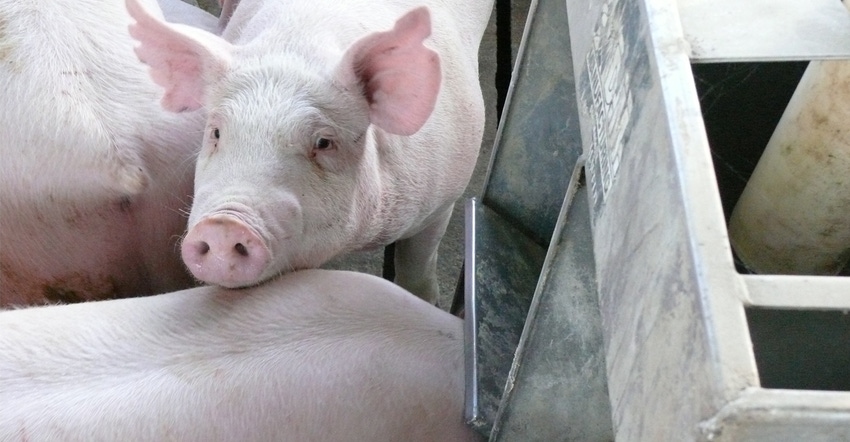
Starting Jan. 1, the veterinary feed directive becomes an effective start for producers to implement safer use of antibiotics prescribed by a practicing veterinarian.
Many people are wondering why the Food and Drug Administration’s current VFD regulations established requirements relating to the distribution and use of VFD drugs and animal feeds containing such drugs.
The FDA’s final rule on VFD will bring the use of human-important drugs under veterinary supervision so they are used only when necessary for assuring animal health.
Veterinarians are required to issue all VFD drugs within the context of a veterinarian-client-patient relationship. This means the veterinarian engages the animal producer to assume responsibility for making clinical decisions about the animal’s health, having appropriate knowledge about the animal by examinations or visits to the farm where the animal is managed, and by providing any necessary follow-ups, evaluations or care.
In an interview with Indiana Prairie Farmer, Timothy M. LaPara with the University of Minnesota Department of Civil, Environmental and Geo-engineering shares his viewpoint on the topic of antibiotic resistance. In addition, Johnathan R. Townsend, a veterinarian with a doctorate from Purdue University, answers frequently asked questions about the topic. LaPara’s and Townsend’s answers follow:
IPF: What are your thoughts on antibiotic resistance in food-producing animals?
LaPara: There is a lot of antibiotic-resistant bacteria in these animals’ manure. Even if your animal is antibiotic-free, you should still check their manure, because it could still have antibiotic resistance.
Townsend: Bacteria over time amounts to resistance. Bacteria will always show resistance. We can improve antibiotic resistance by choosing better antibiotics to begin with.
IPF: What is something you want animal livestock producers or farmers to know about this topic that they may or may not know or want to hear?
LaPara: Producers should treat their manure. However, most don’t want to do this because of the cost.
Townsend: We will have more limitations; vets will be more actively involved with livestock producers. The directive just applies to medicated feed as of now, but all purchasing of antibiotics will go away soon in stores.
IPF: Why do you believe veterinarians say there is no science that supports a link between antibiotic use in livestock with antibiotic-resistant bacteria infections in humans?
LaPara: There isn’t. Antibiotic use leads to antibiotic resistance. "Truthiness" is the quality of seeming or being felt to be true even if not necessarily true. It is assumed not definitive; thinks it’s true but can’t find evidence; feels true. In other words, scientists don’t have enough science to say it is proven.
Townsend: There is very little research that demonstrates the link.
IPF: Do you think the VFD will help the antibiotic resistance in human health?
LaPara: I am concerned and worried about the VFD. I’m concerned because I feel it may make things worse. If you have antibiotic resistance in the area, you will have resistance no matter what.
Townsend: Slightly. It is a good first step; we are assuring judicious use with antibiotics. It’s a good effort to reduce the antibiotic resistance.
IPF: What feedback have you received from the human health side of the antibiotic resistance issue?
LaPara: At some point, animal activists are going to complain that we aren’t taking good enough care of animals. That is, if we continue to take the well-being of animals away, aka, by taking antibiotics away.
Townsend: Personally, I have not had any feedback. It’s the issue in the media. This topic is over-reported, and isn’t as big of an issue for animals as we see in human health.
IPF: What do you want the general public to know or be informed about this topic?
LaPara: Fecal material needs to be treated better. There is resistance in fecal matter.
Townsend: We are trying to use a judicious use of administrating antibiotics. What we are using is not as important to human health.
IPF: What is some advice you can give producers or farmers about antibiotic resistance?
LaPara: Don’t use antibiotics inappropriately. Let a veterinarian come out and inspect your livestock and diagnose them for better controlled treatments.
Townsend: Going forward, use a proper use of antibiotics and use them responsibly. If we don’t, we will decrease the availability of antibiotics. Financially, we will save money if we do a better job in husbandry, because it will reduce the use of antibiotics.
IPF: Is there enough research or science that proves either side of antibiotic resistance?
LaPara: No. This statement is completely biased, but you can ask any scientist, and they will say there isn’t enough science to support antibiotic resistance right now.
Townsend: There is research of antibiotic resistance; where it comes from is debated. Animal health is way overstated, but both can cause antibiotic resistance, and both need to use antibiotics responsibly.
Summing up: There are a few things producers should consider when thinking about antibiotic resistance as presented by these professionals. Animal manure and wastewater solids, treated or not, contain a lot of antibiotic resistance genes. The VFD is a great start to this process, and will benefit producers financially due to less use of antibiotics. Their final market product will have a lesser chance of obtaining antibiotic residue in meats. Antibiotic usage will lead to antibiotic resistance.
Stevens and Fisher are seniors in ag communication at Purdue University.
Informative terms and definitions
Antibiotic: substance that serves to kill bacteria
Withdrawal: the time required before medication reaches a certain level considered safe for human consumption
Veterinary feed directive (VFD): a prescription from a veterinarian that allows livestock producer to use antibiotic feed
Vaccine: substance used to stimulate the immune system
Live vaccine: altered so the vaccine replicates but it is attenuated or modified so it can’t cause disease
Killed vaccine: totally attenuated or killed
Meat residue: the ability to find residue in meat after slaughter
Definitions provided by Jonathan R. Townsend, DVM, Purdue University
About the Author(s)
You May Also Like




